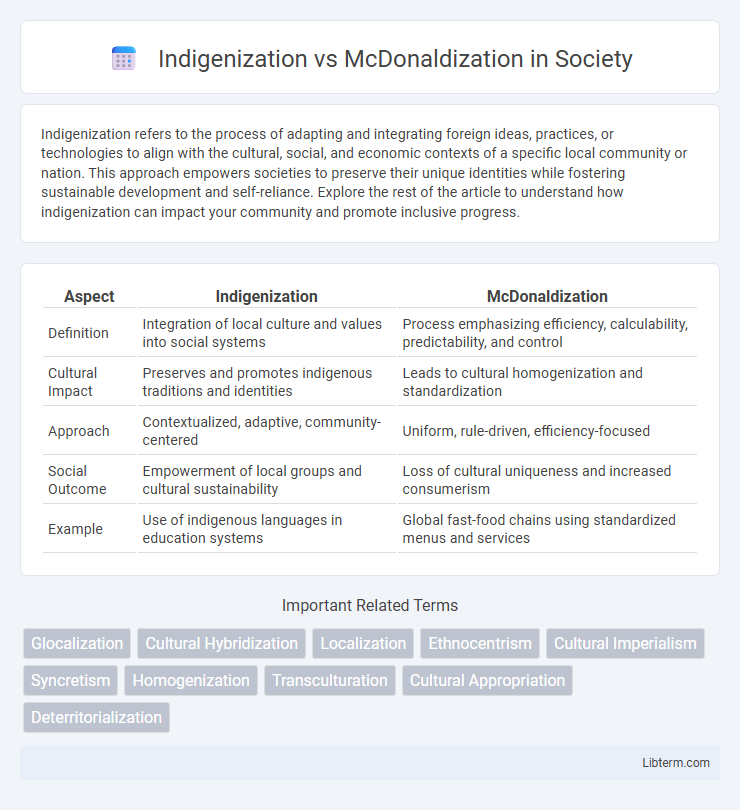Indigenization refers to the process of adapting and integrating foreign ideas, practices, or technologies to align with the cultural, social, and economic contexts of a specific local community or nation. This approach empowers societies to preserve their unique identities while fostering sustainable development and self-reliance. Explore the rest of the article to understand how indigenization can impact your community and promote inclusive progress.
Table of Comparison
| Aspect | Indigenization | McDonaldization |
|---|---|---|
| Definition | Integration of local culture and values into social systems | Process emphasizing efficiency, calculability, predictability, and control |
| Cultural Impact | Preserves and promotes indigenous traditions and identities | Leads to cultural homogenization and standardization |
| Approach | Contextualized, adaptive, community-centered | Uniform, rule-driven, efficiency-focused |
| Social Outcome | Empowerment of local groups and cultural sustainability | Loss of cultural uniqueness and increased consumerism |
| Example | Use of indigenous languages in education systems | Global fast-food chains using standardized menus and services |
Understanding Indigenization: A Cultural Perspective
Indigenization emphasizes adapting global knowledge and practices to fit local cultural values, traditions, and social norms, ensuring relevance and authenticity within indigenous communities. This process involves integrating indigenous languages, knowledge systems, and worldviews into education, governance, and development, promoting cultural sustainability and self-determination. Contrastingly, McDonaldization prioritizes efficiency, predictability, and standardization, often overlooking cultural diversity and local context in favor of uniform global practices.
What Is McDonaldization? Defining Global Standardization
McDonaldization refers to the process by which the principles of the fast-food industry, such as efficiency, calculability, predictability, and control, dominate more sectors of society worldwide, leading to global standardization. This concept, introduced by sociologist George Ritzer, illustrates how cultural globalization promotes homogenized practices and consumer experiences across different regions. Global standardization under McDonaldization emphasizes consistent products and services, minimizing local variation to streamline operations and maximize efficiency.
Historical Roots: Indigenization and Globalization
Indigenization traces its historical roots to post-colonial movements emphasizing cultural revival and local knowledge systems, resisting Western dominance and fostering community-based development. McDonaldization, a concept introduced by sociologist George Ritzer, reflects globalization's spread of standardized, efficiency-driven processes modeled after the fast-food industry, promoting homogeneity in social and economic practices. The tension between Indigenization and McDonaldization highlights a clash between preserving cultural identity and embracing global uniformity driven by capitalist expansion.
Key Differences Between Indigenization and McDonaldization
Indigenization emphasizes the adaptation of global concepts to fit local cultures, preserving indigenous values and traditions, whereas McDonaldization prioritizes efficiency, predictability, calculability, and control through standardized processes across different contexts. Indigenization fosters cultural diversity and empowerment by integrating local knowledge systems, while McDonaldization often leads to homogenization and cultural uniformity driven by corporate rationalization. The key difference lies in indigenization's focus on cultural specificity and autonomy versus McDonaldization's emphasis on global uniformity and streamlined consumer experiences.
Cultural Impacts: Preservation vs. Homogenization
Indigenization fosters the preservation of local cultures by integrating traditional values and practices into modern systems, ensuring cultural diversity remains vibrant and resilient. McDonaldization, driven by global standardization and efficiency, often leads to cultural homogenization, diluting unique cultural identities and promoting uniform consumer behaviors. The tension between these processes highlights the challenge of balancing cultural authenticity with globalization's drive for uniformity in social and economic spheres.
Economic Dimensions of Indigenization and McDonaldization
Indigenization in economic dimensions emphasizes the localization of resources, ownership, and decision-making to empower indigenous communities and promote sustainable development tailored to cultural values. McDonaldization, characterized by efficiency, calculability, predictability, and control, standardizes economic processes to maximize profits and streamline production, often at the expense of local traditions. The contrast highlights a tension between economic models prioritizing community autonomy and culturally embedded practices versus globalized, uniform methodologies driven by market rationalization.
The Role of Technology in Shaping Local and Global Cultures
Technology drives McDonaldization by promoting standardization and efficiency through global digital platforms, creating homogenized cultural experiences worldwide. In contrast, Indigenization leverages technology to adapt and reinterpret these global influences, preserving and revitalizing unique local traditions and identities. This dynamic interplay shapes how local cultures resist or integrate global technological trends, influencing cultural diversity in the digital age.
Case Studies: Successes and Challenges in Cultural Adaptation
Indigenization in case studies reveals successes such as the adaptation of global brands to local customs, exemplified by McDonald's menu variations in India, which respect vegetarian preferences and religious dietary restrictions. McDonaldization's challenges arise when standardized processes fail to account for cultural nuances, resulting in resistance or consumer rejection, as seen in Japan where overly rigid service models conflicted with local social behaviors. Successful cultural adaptation often requires blending McDonaldization's efficiency with indigenization's cultural sensitivity to achieve market acceptance and sustainable business growth.
Resistance and Adaptation: How Societies Respond
Indigenization involves societies resisting external cultural dominance by adapting global influences to fit local traditions and values, fostering cultural preservation and empowerment. McDonaldization describes the spread of standardized, efficiency-driven practices from global corporations, often leading to cultural homogenization but also pragmatic adaptation in consumer behavior. Societies respond by blending local customs with global practices, creating hybrid cultural forms that challenge uniformity while embracing certain efficiencies.
The Future of Cultural Dynamics: Towards Balance or Dominance?
Indigenization emphasizes the preservation and revitalization of local cultures by integrating traditional values and practices into modern contexts, fostering cultural resilience and diversity. McDonaldization promotes homogenization through standardized, efficient, and calculable practices that prioritize uniformity and global corporate influence, often eroding unique cultural identities. The future of cultural dynamics hinges on achieving a balance where global interconnectedness coexists with respect for indigenous knowledge systems, preventing cultural dominance and supporting pluralistic coexistence.
Indigenization Infographic

 libterm.com
libterm.com